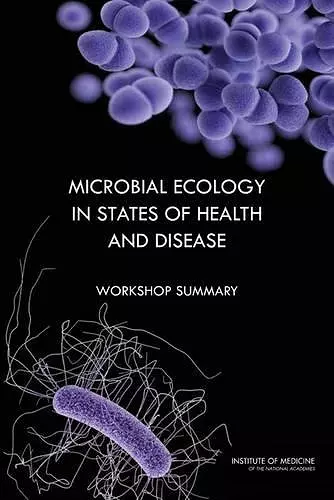Microbial Ecology in States of Health and Disease
Workshop Summary
Institute of Medicine author Board on Global Health author Forum on Microbial Threats author Alison Mack editor LeighAnne Olsen editor Eileen R Choffnes editor
Format:Paperback
Publisher:National Academies Press
Published:18th Mar '14
Currently unavailable, and unfortunately no date known when it will be back

Individually and collectively, resident microbes play important roles in host health and survival. Shaping and shaped by their host environments, these microorganisms form intricate communities that are in a state of dynamic equilibrium. This ecologic and dynamic view of host-microbe interactions is rapidly redefining our view of health and disease. It is now accepted that the vast majority of microbes are, for the most part, not intrinsically harmful, but rather become established as persistent, co-adapted colonists in equilibrium with their environment, providing useful goods and services to their hosts while deriving benefits from these host associations. Disruption of such alliances may have consequences for host health, and investigations in a wide variety of organisms have begun to illuminate the complex and dynamic network of interaction - across the spectrum of hosts, microbes, and environmental niches - that influence the formation, function, and stability of host-associated microbial communities.
Microbial Ecology in States of Health and Disease is the summary of a workshop convened by the Institute of Medicine's Forum on Microbial Threats in March 2013 to explore the scientific and therapeutic implications of microbial ecology in states of health and disease. Participants explored host-microbe interactions in humans, animals, and plants; emerging insights into how microbes may influence the development and maintenance of states of health and disease; the effects of environmental change(s) on the formation, function, and stability of microbial communities; and research challenges and opportunities for this emerging field of inquiry.
Table of Contents- Front Matter
- Workshop Overview
- A1 Effector and memory T cell responses to commensal bacteria--Yasmine Belkaid, Nicolas Bouladoux, and Timothy W. Hand
- A2 What are the consequences of the disappearing human microbiota?--Martin J. Blaser and Stanley Falkow
- A3 Pathways in microbe-induced obesity--Laura M. Cox and Martin J. Blaser
- A4 Microbial exposure during early life has persistent effects on natural killer T Cell function--Torsten Olszak, Dingding An, Sebastian Zeissig, Miguel Penilla Vera, Julia Richter, Andre Franke, Jonathan N. Glickman, Reiner Siebert, Rebecca M. Barron, Dennis L. Kasper, and Richard S. Blumberg
- A5 The application of ecological theory toward an understanding of the human microbiome--Elizabeth K. Costello, Keaton Stagaman, Les Dethlefsen, Brendan J. M. Bohannan, and David A. Relman
- A6 Seasonal restructuring of the ground squirrel gutmicrobiota over the annual hibernation cycle--Hannah V. Carey, William A. Walters, and Rob Knight
- A7 Lessons...
ISBN: 9780309290623
Dimensions: unknown
Weight: unknown
548 pages